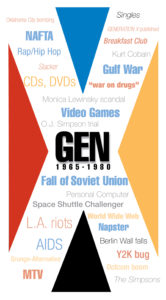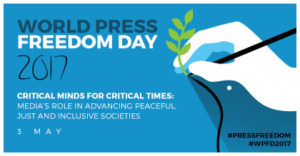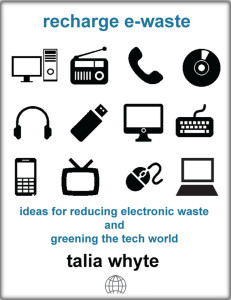Marketing to Generation X
 I went to a seminar last week on how to market products and services to Millennials and Baby Boomers. I know it is trendy to cater to these large demographics; however, I find it amazing how most marketers totally forget about a smaller demo sandwiched that is just as important – Generation X.
I went to a seminar last week on how to market products and services to Millennials and Baby Boomers. I know it is trendy to cater to these large demographics; however, I find it amazing how most marketers totally forget about a smaller demo sandwiched that is just as important – Generation X.
Gen Xers are considered to be those born between 1965 and 1980. I fall near the tail-end of the demo. I don’t have much in common culturally and economically with Millennials, but marketers seem to think I fall into the younger demographic.
Let me give you some reasons more attention should be given to Generation X:
- Spending Power: Gen Xers actually have more spending power than Baby Boomers and Millennials. As a matter of fact, while we currently make up more than 25 percent of the American population – 65 million people, we have higher incomes than the other two demos. We also have the highest rate of brand loyalty. This will become more evident as Boomers start to retire and, well, many Millennials continue to live at home with their parents.
- Financial stability: Statistically, Gen Xers are more responsible with their money. We save more money or invest it into buying homes, leaving more money for our family and starting businesses. In my opinion, I think this need for financial security is caused by the fact that we are the first generation to come into the working world without pensions offered by employers.
With all this said, why is Generation X always overlooked? Many marketers literally don’t know how to communicate with us. We came of age at the dawn of the current technological revolution, with one foot in the analog world (Boomers) and the other in the social media/Netflix/iPhone world (Millennials). The best and most useful tool for Gen Xers is email communication that is tailored to our personal needs. Email, not Twitter, is my thing and that is how I mainly talk to my cohorts.
Also, marketing should be geared to our financial and life responsibilities. As we grew up as latchkey kids, we are very independent-minded and make safe life decisions. I am always looking for the best and financially sound ways to run my business, pay my bills and take care of my family. I tend to research most products or services online and finding deals before deciding to purchase. So a coupon or a nice discount, preferably in an email marketing campaign detailing said product or service, would be great.
Gen Xers are more nostalgic. At least once a week I say “things were so much better in the 90s.” Really, everything was more interesting in the 90s – MTV actually showed music videos, hip-hop was real music (as was Pearl Jam and Nirvana), The Fresh Prince of Bel-Air and Living Single were awesome shows, the OJ Simpson trial was the greatest reality TV show, Rodney King’s black life mattered, everyone wore ‘X’ caps and Bill Clinton was president. So we tend to spend money on things that support our nostalgia. It is no wonder there are so many TV shows and movies from the 80s and 90s making a comeback and Salt-n-Pepa would be used in a Geico commercial.
My main point here is that Generation X matters. Don’t forget about us in your next marketing campaign!


